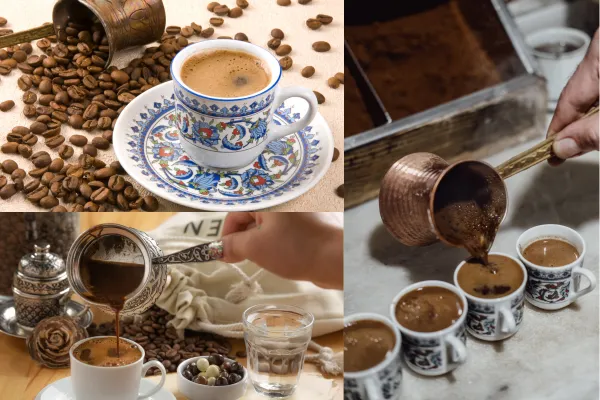When I worked at Starbucks in Bahrain, many customers, especially from Saudi Arabia, would ask for Turkish Coffee. Unfortunately, it wasn’t something we could make for them, and to this day, I still wonder how it tastes. Turkish Coffee is more than just a drink—it’s a deeply rooted cultural experience with centuries of history behind it. Known for its strong, bold flavor and thick, rich texture, it’s an intriguing coffee preparation that I’ve always wanted to try.
Table of Contents
Discovery
Turkish Coffee dates back to the Ottoman Empire in the 16th century and has remained a popular method of brewing coffee across the Middle East, North Africa, and parts of Europe. It’s brewed using very finely ground coffee beans and boiled in a special pot called a cezve (or ibrik), giving the drink its signature thick consistency and unfiltered nature. Traditionally, it’s enjoyed in small sips and often accompanied by sweets like Turkish delight.

Turkish Coffee Recipe
Unlike the espresso-based drinks I’m familiar with, Turkish Coffee involves a completely different brewing method:
Ingredients:
- 1 heaping teaspoon of finely ground Turkish coffee (much finer than espresso)
- 1 small cup of water
- Sugar (optional)
- Cardamom (optional, for an authentic Middle Eastern twist)
Instructions:
- Combine the finely ground coffee, water, and optional sugar in a cezve (a small, long-handled pot made specifically for Turkish Coffee).
- Slowly bring the mixture to a boil over low heat, without stirring. As the coffee foams up, remove it from the heat just before it boils over.
- Gently pour the foam into a small coffee cup, then return the cezve to the heat and allow it to foam up again before serving.
- Let the coffee settle for a minute, as there will be fine coffee grounds at the bottom of the cup. Sip slowly and enjoy!
What Do it Taste Like
From what I’ve learned, it has very strong and bold flavor. The unfiltered nature of the drink means that it’s thicker and more intense than other brewing methods like drip coffee or espresso. It’s known for being smooth and rich, with a velvety texture.
- Strong and Bitter: The flavor is often described as bold, with a slightly bitter edge due to the fine ground that remains in the cup. Unlike filtered coffee, you’re drinking it with the grounds, which gives it a fuller body.
- Customizable Sweetness: One unique aspect of it is that sugar is added during the brewing process, not after. You can make it “sweet” (with a lot of sugar), “medium” (with some sugar), or “plain” (no sugar at all), depending on your taste.
- Spicy Twist (Optional): In many Middle Eastern countries, especially Saudi Arabia, cardamom is often added to Turkish Coffee, giving it a fragrant, spicy aroma and taste that elevates the experience.
Why People Love It
The popularity of Turkish Coffee is more than just about the taste—it’s a social ritual and a cultural experience. Here’s why people, especially in the Middle East, love it:
- A Social Drink:
It is often enjoyed in social settings, whether at home with family or during gatherings with friends. It’s more than just about drinking coffee—it’s a way to slow down, connect, and engage in conversation. - Fuller Experience:
The rich, thick texture and strong flavor make it more of an experience than a quick caffeine fix. It’s meant to be savored slowly, often alongside sweets like baklava or Turkish delight. - Tradition:
Turkish Coffee is steeped in history and tradition. In many cultures, it’s associated with hospitality and welcoming guests. It’s also part of special rituals, like fortune-telling using the leftover grounds at the bottom of the cup.
What Makes Turkish Coffee Different from Other Coffees?
While espresso is known for its strong flavor, Turkish Coffee takes it to another level due to the brewing method and the fact that the grounds are never filtered out. Here are some key differences:
- Finer Grind: Turkish coffee is ground much finer than espresso, almost like powder. This contributes to the thickness and richness of the final drink.
- Brewing Method: Instead of using pressure like in an espresso machine, Turkish Coffee is slowly boiled in a cezve, allowing the flavors to develop fully.
- Unfiltered: Unlike most coffee drinks, Turkish Coffee is unfiltered, which means you’re drinking the coffee grounds along with the liquid. This gives it a unique, thick texture and strong taste.
Caffeine Content
Turkish Coffee is pretty potent. A typical small serving contains about 50-60 milligrams of caffeine, similar to espresso, but the experience feels stronger due to the thickness and intensity of the drink.
Calories and Macros
| Nutrient | Amount per serving of Turkish Coffee |
| Calories | 20-30 (without sugar) |
| Protein | 0 grams |
| Carbohydrates | 0 grams |
| Fat | 0 grams |
| Caffeine | 50-60 milligrams |
Adding sugar will increase the calorie count, but the base drink itself is very low in calories.
Interesting Facts
- UNESCO Heritage: Turkish Coffee was recognized by UNESCO as part of the world’s “Intangible Cultural Heritage” because of its deep-rooted cultural significance.
- Fortune-Telling Tradition: In many cultures, the grounds left at the bottom of a cup of Turkish Coffee are used to tell fortunes. Once the coffee is finished, the cup is flipped upside down, and the patterns left by the grounds are interpreted by a fortune-teller.
- Small but Powerful: Turkish Coffee is served in small cups (similar to espresso), but its bold flavor and thick texture make it feel much more substantial than a regular cup of coffee.
Conclusion
Though I’ve never had the chance to make Turkish Coffee during my time at Starbucks, I’ve always been curious about it—especially given how often customers from Saudi Arabia requested it. With its rich history, bold flavors, and thick texture, Turkish Coffee is a drink that offers more than just caffeine. It’s a ritual, an experience, and a connection to a long-standing tradition of coffee culture.
If you’re ever looking to try something new, or want to explore a deeper, more traditional coffee experience, give Turkish Coffee a try. I know it’s high on my list of must-try drinks, and I hope to enjoy it soon!








